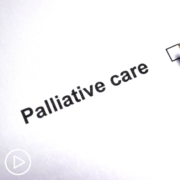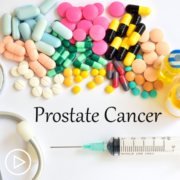Why Should Prostate Cancer Patients Partner in Care Decisions?
Why Should Prostate Cancer Patients Partner in Care Decisions? from Patient Empowerment Network on Vimeo.
Why should prostate cancer patients play an active role in their care decisions? Dr. Atish Choudhury explains the concept of shared decision-making and shares credible resources for patients.
Dr. Atish Choudhury is the Co-Director of the Prostate Cancer Center at Dana-Farber/Brigham & Women’s Cancer Center. Learn more about Dr. Choudhury here.
See More from Engage Prostate Cancer
Related Resources

|

|

When Should Prostate Cancer Patients Consider a Clinical Trial? |
Transcript:
Katherine:
I’d like to talk about the term “shared decision-making.” What does that mean to you, exactly?
Dr. Choudhury:
So, shared decision-making really means that when the physician conveys information to a patient, that the patient really understands what’s being said, and what, really, the alternatives are – and the real risks and the benefits of the different alternatives. And so, if a patient goes to see a surgeon and they say, “Well, we should take this out,” and there’s never really discussion of what the risks and benefits of the alternatives are –and the alternatives could be just watching, or radiation, or even more intensive treatment, then that’s not really shared decision making.
But what I think is not exactly shared decision making is when the patient is getting information from really non-knowledgeable or non-reputable sources and then starts to come up with conclusions based on hearsay or people trying to sell them a product that really hasn’t been FDA approved or really tested. And so, those are situations where when the information is really not good, then we can run into troubles with communications. But there are a lot of really excellent sources for patient information that’s available, and the Prostate Cancer Foundation is a really good source, and a lot of the academic prostate cancer centers are really great sources of information.
And so, being educated and asking good questions is really the best way for a patient to feel comfortable that they’re not missing anything and that they’re, again, having all the information that they need to make a good choice for themselves.
Katherine:
Do you have any advice to help patients speak up if they’re feeling like they’re not being heard?
Dr. Choudhury:
Sure. So, I mean, there’s never any barrier to bringing up concerns with whoever that you’re seeing, and if you feel like whoever you’re talking to isn’t being receptive to those concerns, then certainly, second opinions are very useful. But if you see multiple doctors and they’re kind of telling you the same thing based on good evidence, then you probably have to take in what they’re saying, and process it, and see if it really does apply to your particular situation.
But any cancer doctor who really has your self-interest in mind will be very open to discussing the concerns that you have, so you should absolutely bring them up.










